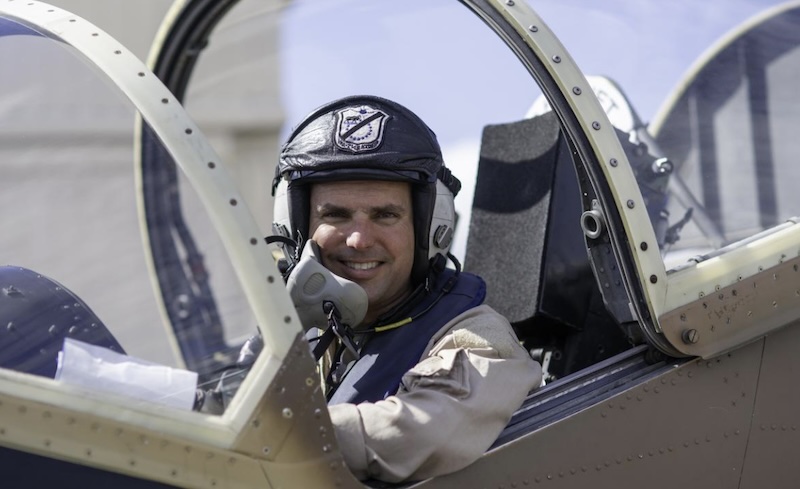Dan Duggan – facing decades in a US prison on conspiracy charges – has accused ASIO and a US intelligence agency of recruiting, actively monitoring and then turning on him before his dramatic 2022 arrest. Andrew Gardiner reports.
In a testimony of twists to do John le Carré proud, the pilot and former American marine Dan Duggan has lifted the lid on how, he says, ASIO and the US Naval Central Intelligence Service (NCIS) recruited him to their cause in a well-known Hobart hotel 12 years ago before throwing the book at him – on bogus grounds – in 2022.
Languishing in Lithgow Prison, NSW, and facing extradition to the US (followed by a possible 65 year sentence) at a hearing this Friday, Duggan’s explosive account of events leading to his arrest were revealed in a March letter to the inspector general of intelligence and security (IGIS) excerpts of which have been viewed by MWM.
“Upon arrival at the hotel lobby, I was … unexpectedly introduced to a person who identified themselves as an agent from the US NCIS,” Duggan says of the 2012 encounter. “I was completely surprised by the (presence of an) NCIS agent (and it) left me feeling quite awkward, anxious, confused and to be honest, a bit upset that (ASIO) was not previously forthcoming” about the meeting’s purpose.
As the meeting got under way, it soon emerged that the three agents present – two Australians and one American – had little interest in events at the centre of Duggan’s 2017 indictment by a US Grand Jury on conspiracy and arms trafficking charges (namely, the training of Chinese pilots in South Africa from 2011-12).
Instead, they showed great interest in Duggan’s plans to expand his aviation consultancy work to China in 2013, one ASIO agent getting right to the point: “if you can meet any (Chinese) generals we can do business.”
This suspected solicitation to spy for the ‘Five Eyes’ intelligence alliance – Australia, Canada, New Zealand, the UK and US – was “so unexpected, and said with such conviction, (that it was) imprinted in my mind, made me anxious and I think it is fair to say I was in slight shock,” Duggan wrote.
Duggan assists ASIO
In his letter to the IGIS, Duggan clearly states that he took the ASIO/NCIS approach “as a call for an important contribution to an overall intelligence gathering mission for Australia.” After some consideration, “I decided to assist ASIO,” he added, before heading to China in March, 2013.
Crucial to Duggan’s chances of success in China was Su Bin, his ‘business agent’ who – unknown to Duggan, his lawyers say – was also a hacker, with a habit of stealing US military aircraft designs. Su Bin was arrested in Canada on US charges some 15 months after Duggan arrived in the People’s Republic, triggering an automatic exit ban from China for him and his family.
“This put us in a very precarious and unpredictable position as some elements (among) Chinese authorities suspected me of contributing to Su Bin’s arrest,” Duggan wrote. On the other side of the world, the arrest also appears to have raised red flags among American authorities, who discovered correspondence between Duggan and Su Bin on the latter’s laptop and phone.
Those messages showed that Su Bin paid for Duggan’s travel from Australia to Beijing in May 2012, and Duggan had asked for his help in sourcing Chinese aircraft parts for his Top Gun tourist flight business. Perhaps of greater concern to American authorities, however, was Su Bin’s work as the employment broker who brought together Duggan and Chinese state aviation company AVIC.
AVIC was blacklisted by the US last year due to its links to the Chinese military.
ASIO and NCIS knew about training
As one might expect from matters involving intelligence agencies, there are a bunch of questions around what is a very murky case. In a legal filing, Duggan’s lawyer, Bernard Collaery, states the ASIO and NCIS agents were aware of Duggan’s involvement in training pilots for AVIC when they met him in the Hobart hotel in 2012.
Despite questions this raises around their true motives, Duggan continues to believe they were genuinely “asking me to help them in gathering valuable intelligence.”
The questions don’t end there. Why, for example, did the US indict Duggan on charges surrounding his training Chinese pilots in South Africa – events ASIO and NCIS agents showed no real interest in at the Hobart meetings – when their true interest, at one point or another, seemed to settle on Aviation Industry Corp of China and Su Bin?
“Charges of convenience”
Could it be that Duggan’s 2017 indictment was on ‘charges of convenience’: that is, the only charges for which they had enough so-called ‘evidence’ to sway a Grand Jury? Was it an unnecessary move?
Certainly, Duggan’s non-citizenship of a country aiming to put him away for 65 years will be raised at Friday’s extradition hearing.
MWM has seen and established the veracity of Duggan’s Australian citizenship.
Duggan drops US citizenship
In something of a sneak preview of his court strategy this Friday, Duggan’s lawyer, Bernard Collaery, penned a March letter to the Attorney General, Mark Dreyfus, pointing out serious flaws in the US extradition action.
Despite the US continuing to insist Duggan was a US citizen at the time he trained pilots in South Africa, Duggan became an Australian citizen in 2012, effectively ending his American citizenship from that moment under US law.
While Duggan took the extraordinary step of renouncing his US citizenship in 2016 (above right) it didn’t matter legally. He was already a sole Australian citizen.
Collaery also touched on the “recruiting” of Duggan in Hobart in 2012: “ASIO and United States officials were discussing issues with our client, in anticipation that he would either assist them with intelligence acquisition involving China and otherwise passively enable them to monitor our client’s engagement in China, which they openly encouraged.”
He described the extradition attempt as a baseless, Trump-era “political prosecution,” since Duggan’s training the Chinese pilots was perfectly legal.
Collaery is also expected to raise the “double criminality” rule applying to extraditions, in which Duggan cannot be extradited on charges arising from US laws that have no equivalent here. He may also argue Duggan faces “political charges” stemming from a 2017 chill in China-US relations still five years away when Duggan trained Chinese pilots in 2011-12.
The case for conspiracy and arms trafficking will be heard by Magistrate Daniel Reiss at Sydney’s Downing Centre Local Court on Friday. The big question remains, particularly in the era of the AUKUS treaty, why should the Australian government extradite one of its citizens to the US when there are no charges against him in this country? And also when there is yet to appear any robust evidence of conspiracy?
The echoes of the Julian Assange imbroglio ring loudly. Assange faces no charges in this country but is subject to US extradition proceedings in a third country, the UK.
An Adelaide-based graduate in Media Studies, with a Masters in Social Policy, I was an editor who covered current affairs, local government and sports for various publications before deciding on a change-of-vocation in 2002.

